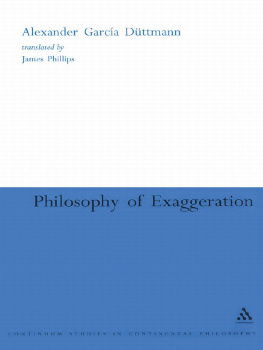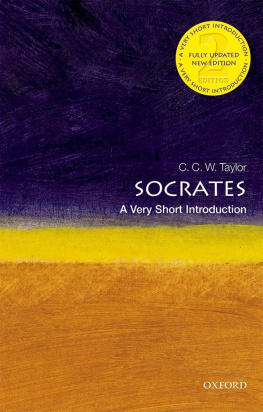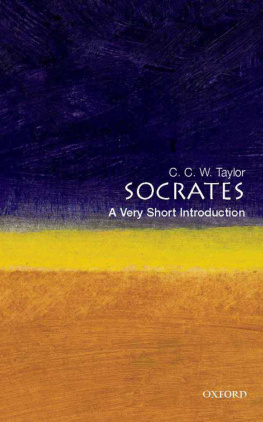Philosophy of Exaggeration
Continuum Studies in Continental Philosophy:
Wittgenstein and Gadamer, Chris Lawn
Whos Afraid of Deleuze and Guattari?, Gregg Lambert
Sartres Ethics of Engagement, T. Storm Heter
Husserls Phenomenology, Kevin Hermberg
Heidegger and the Place of Ethics, Michael Lewis
Derrida and Disinterest, Sean Gaston
Deleuze and the Unconscious, Christian Kerslake
Deleuze and Guattaris Philosophy of History, Jay Lampert
Deconstruction and Democracy, Alex Thomson
Philosophy of
Exaggeration
Alexander Garca Dttmann
Translated by James Phillips

Continuum
The Tower Building, 11 York Road, London SE1 7NX
80 Maiden Lane, Suite 704, New York NY 10038
This English Translation James Phillips 2007
Originally published as Philosophie der bertreibung Suhrkamp Verlag:
Frankfurt am Main, 2004
All rights reserved. No part of this publication may be reproduced or transmitted in any form or by any means, electronic or mechanical, including photocopying, recording, or any information storage or retrieval system, without prior permission in writing from the publishers.
British Library Cataloguing-in-Publication Data
A catalogue record for this book is available from the British Library.
ISBN: HB: 0-8264-9562-1
978-0-8264-9562-4
Library of Congress Cataloging-in-Publication Data
Garca Dttmann, Alexander.
[Philosophie der bertreibung. English]
Philosophy of exaggeration / By Alexander Garca Dttman ;
translated by
James Phillips.b
p. cm.
ISBN-13: 978-0-8264-9562-4
ISBN-10: 0-8264-9562-1
1. Exaggeration (Philosophy) I. Title.
B105.E77G3713 2007
190-dc22
2006033298
Lexical Note
The concept of exaggeration is not used in this book simply in the familiar sense. For the conventional use of the word implies that one measures exaggerations against their opposite, namely against appropriateness and adequacy; one thereby already depreciates them. Here exaggeration means, first of all, the strength for a disclosing transgression of a limit, and secondarily the excess that cannot be recovered conceptually. Of course, both meanings also have their negative counterparts. The transgression of the limit may prove inadmissible or obfuscatory, the excess may turn out to be the bad infinite. Exaggeration and exactitude are perhaps no more irreconcilable than exaggeration and justice. Philosophy drives exaggeration to the limit at which it becomes that which drives philosophy.
The coldest winter I ever spent was a summer in San Francisco.
(attributed to Mark Twain)
s curis que aqestes persones que no shan tancat dins un sistema, tal vegada per no prescindir de cap aspecte de la veritat, siguin les que sens apareixen com a mes trapasseres.
(Ooren Villalonga, Bearn o La sala de les munyeques)
It is curious to note that those people who have not enclosed themselves within a system, perhaps in order not to renounce any aspect of truth, appear as real troublemakers.
Splendour and Misery of Exaggeration
An Introduction
The instant we attain an overview, we are at once utterly alone, without a single human being to keep us company. Am I in danger of the judgement, of the council, of hellfire, because I fall prey to my exaggerations, working myself up into such a incensed pitch of exaggeration that I then consider this exaggeration the absolutely consistent fact and no longer even
In philosophy it is possible to differentiate between thinkers according to whether they seek in the exception and exaggeration insight with regard to the rule, or whether they subordinate the exception to the rule, viewing it as nothing but a misleading exaggeration. A thought may acknowledge the necessity of exaggerations or it may ready itself against the danger of their caprice. But that one can think it without exaggeration is just as little established as the inverse proposition, namely that recognition of an exaggeration essential to thought has already to be understood as its justification. Perhaps thought is not permitted to exaggerate, precisely because it is not able to do anything other than exaggerate.
In the exaggeration that transgresses a limit there invariably lies a tendency to an autonomization of thinking. At the very point when it is impossible to think without exaggerating, thought must resist exaggeration: this, in the light of the threatened autonomization of thinking, can be variously construed. For such an autonomization can lead to an entanglement in problems or pseudo-problems, in explanations, images, theses that denote a failure of philosophy as well as express themselves in a race after intensifications.
In the case of the former, one says more than one can or may say meaningfully, thereby becoming entangled in statements that on closer inspection prove themselves to be vacuous. Here exaggeration can arise because the philosopher, under pressure from an object or issue to come up with a thought and to explain matters conceptually, neglects to recognize in the others speech its madness or emptiness, the symptomatic exaggeration to which his own speech is likewise exposed or may even be inclined.consistent thought. One asks how thought can be propelled across yet another limit and a word can be said that is no longer a final word precisely because it is the final word. At the limit of the expressible one does not try merely to say the inexpressible, but rather to outdo oneself in the saying of the inexpressible. The quarrel over originality thereby breaks out, the suspicion of plagiarism is aroused, the eminence grise of one-upmanship plays his part, all the more peremptorily and obsessively laying claim to the purity of objective observation and bending to the power of the syllogism as he inevitably entangles himself in strategies. Exaggeration, as the autonomization of thinking, accordingly brings about a double-faceted comportment on the part of philosophy.
perceive the real fact of the matter, only this exaggeration pushed beyond all limits? Does the sublimity of the exaggeration intoxicate me without the question arising whether it instructs me in some way about myself? If all the ruined human beings we know have lost their nerve at the critical moment, if we are not permitted to lose our nerve at the critical
Whereas the one philosopher points out the pre-existence of exaggeration and the inadmissibility of the concomitant step across the limit beyond which lurk pseudo-problems, the other, for whom each and every exaggeration remains an understatement and a hesitation before the limit, incites to further transgressions. What is common to both is an ambiguous concern with purity. The ambiguity is manifest in the thought itself, then in its effects, in the intention or the tendency that it pursues.
The ambiguity to which Wittgenstein abandons the reader of his Philosophical Investigations is that of language harbouring the possibility of philosophical salvation together with the possibility of the philosophers damnation, as though with the disappearance of either possibility the possibility of language itself would necessarily disappear.
If Derrida speaks of quasi-transcendental suppositions that possess an almost universal validity because they cannot, in turn, be deconstructed; if he wants, on the one hand, to release these conditions from every positive or negative relation to recognizable forms of the concept or of history, yet without, on the other hand, in any way denying the significance of these relations;
Next page











